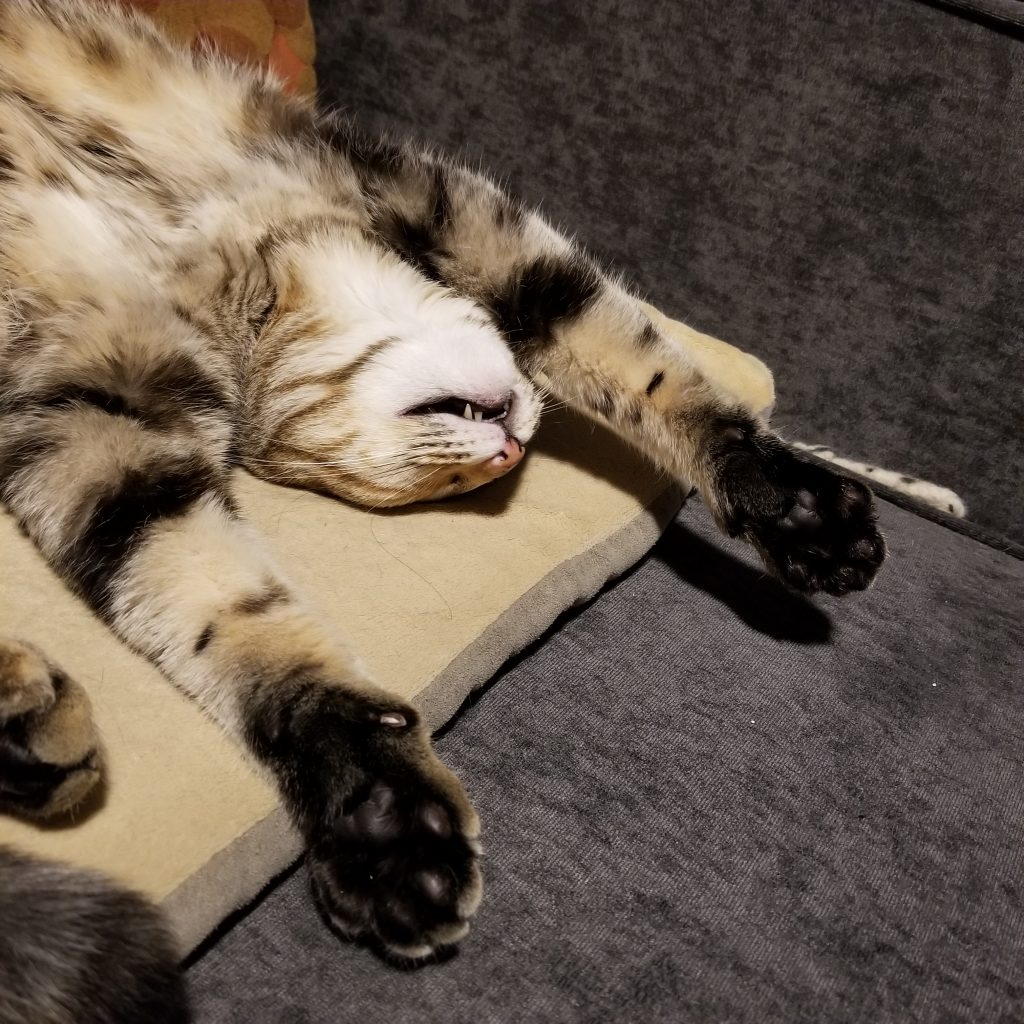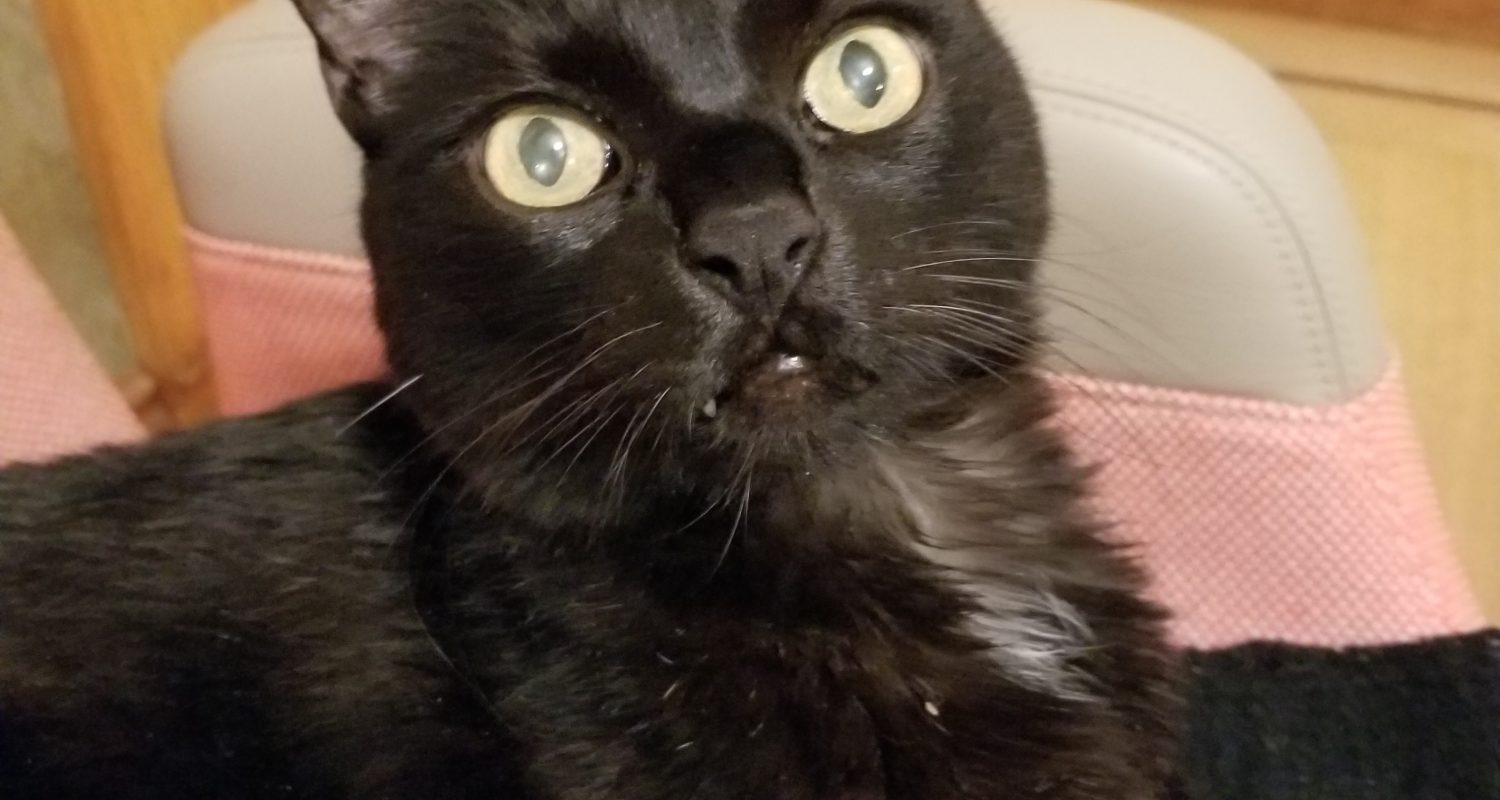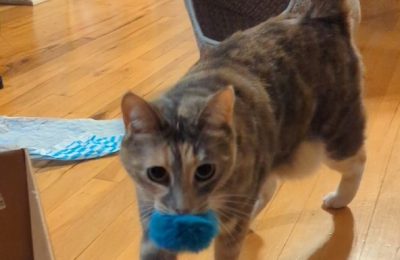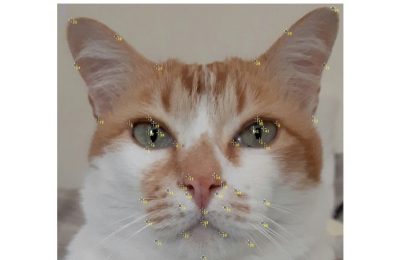A new study takes a biased look at cats
I really hemmed and hawed about whether to comment on this recent publication that has gotten a lot of press lately. But the headlines keep coming: “Is Your Cat a Psychopath? Probably, Researchers Say,” “Is Your Cat an Actual Psychopath? Take This Test and Find Out,” and so on. Now sometimes science isn’t particularly sound, and to be fair, it can be challenging to do science well. There’s always room for improvement. But sometimes a study is actually misleading or potentially even harmful, especially when it perpetuates faulty ideas about cats.
The recent publication “A domestic cat (Felis silvestris catus) model of triarchic psychopathy factors: Development and initial validation of the CAT-Tri+ questionnaire” veers into that territory. Rather than explore typical cat behavior in search of things that might indicate a maladaptive response or problematic behaviors, the researchers start with a human-biased concept: looking for psychopathy in cats.
Psychopathy is considered a human mental disorder, defined by several traits including a lack of empathy, socially deviant behavior, being manipulative, and antisocial behavior. Psychopathy is also considered an innate trait, rather than something that develops due to something such as abuse, a faulty upbringing, or life stressors. It is observed in less than 1% of the human population. It should be noted that even in humans, the use of the term psychopath, and some of the tools used to measure this disorder are not without controversy. A more recently developed tool focuses on three traits: boldness (low levels of fear), disinhibition (lack of restraint), and meanness (deficient empathy), to define psychopathy in humans.
Although the authors of the current study offer some examples of psychopathy in other species, they are questionable (e.g., a description of Basenji dogs as “psychopaths” by a researcher who studied whether different breeds of dogs would “resist” treats if they were simultaneously being punished – um, who is the psychopath here?). Female chimpanzees who cannibalized their offspring (cannibalism is fairly common in the animal kingdom), or being “mean” are other provided examples of psychopathy in other species. So…a pretty weak foundation to build a case for animal psychopathy.
So, now for the cats. The authors propose that there has been a lack of research on feline psychopathy because there’s no available questionnaire for exploring these traits in cats. (I might instead argue that there’s no point in studying something that doesn’t really exist). We already have an excellent, validated tool for assessing cat behaviors (including ones that might be considered problematic) in the Fe-BARQ, a 100-item survey that started with a full range of feline behaviors (not just “negative” traits).
To study “psychopathy” in cats, the researchers started by asking 549 cat owners if their cats displayed behaviors that suggested being bold, mean or disinhibited. Then they were asked to volunteer any additional traits that might be considered psychopathic. Note, the resulting descriptions included being “adventurous” and included several loaded, problematic and ill-defined terms such as “dominance” and “aggression.” From this survey, the researchers then developed a list of 58-items. An additional 1463 cat owners were next given the 58-item survey in addition to some measures of the cat-owner relationship, and a broader survey of cat personality.
The responses to the 58-item survey were analyzed to see if there were clusters among them (a technique called factor analysis, which assesses which items are responded to similarly across participants). From this the authors determined there were five factors in their scale for cat psychopathy: the three described in humans (boldness, disinhibition, and meanness) plus two additional factors: pet-unfriendliness and human-unfriendliness.
To give examples of some of the survey items in each factor:
Boldness: “My cat explores new places,” “My cat regularly hunts small creatures,” “My cat sits in high places.”
Disinhibition: “My cat demands attention,” “My cat runs around the house for no apparent reason,” “My cat is curious.”
Meanness: “My cat disobeys house rules,” “My cat does not appear guilty after misbehaving,” “My cat hides and jumps out on people.”
Pet-unfriendliness: “My cat displaces other pets from favourable positions,” “My cat is aggressive toward non-pet cats.”
Human-unfriendliness: “My cat does not like being petted,” “My cat has sudden mood changes.”
Participants respond on a scale of 1-5, 1 meaning “Does not describe my cat” and 5 meaning “Describes my cat extremely well.” A higher score means that your cat would score higher on that “psychopathy factor.”

Now, I have focused on some of the more problematic items here, because I think they demonstrate how many VERY typical cat behaviors are being used to describe cats as psychopaths (I kept finding myself wondering, have these researchers lived with any cats?). Furthermore, the use of terms like “dominance,” “non-social,” and “aggressive” are very biased, not operationalized (i.e., clearly defined) and ignore our current understanding of cat relationships and behavior. Cats have not agreed to “house rules” – they are just subjected to them. Our companion animals of course think and feel, but we have very little evidence that they experience guilt or empathy, or if they do, they probably experience them in VERY different ways than we do.
I’m not saying that cats do not display behaviors that are problematic to humans. But that does not make cats psychopaths. In fact, many undesirable cat behaviors are simply a cat responding to stressors in their environment. They are a perfectly normal response to an abnormal or subpar environment. To that end, I wish more attention was paid to some of Dr. Daniel Mills’ work looking at behavior problems using a medical model, which focuses on the functional value of a given behavior rather than judging it, considering the context/environment.
In other cases, the traits being described as psychopathic would be considered positive to many cat owners (e.g., “my cat is curious”), or could have alternative explanations rather than a personality disorder (e.g., a lack of socialization as a kitten).
Words matter. Labeling a cat as a psychopath instead of describing their behavior does not help cats, humans, or the cat-human relationship. It does not advance our scientific understanding of cat behavior or personality. Although this survey might reveal whether or not your cat displayed certain traits which you may or may not find desirable, it cannot tell you whether your cat is truly a psychopath.
Resources
Mills, D. S. (2003). Medical paradigms for the study of problem behaviour: a critical review. Applied Animal Behaviour Science, 81(3), 265-277.
Mills, D. S. (2017). Perspectives on assessing the emotional behavior of animals with behavior problems. Current opinion in behavioral sciences, 16, 66-72.




Your wonderful article is very much needed in response to ridiculous and prejudiced studies that attribute human issues and behaviors and judgements to animals. I agree and have found that most behavioral issues stem from stressors and toxic patterns in a pet’s environment- likely reflecting problems that actually exist in the human family unit. To blame a cat for responding is just wrong- and does nothing to improve human’s understanding and empathy for cats. Thank you once again for your article.
Thank you for your enlightening article.
Once again it appears that, “junk science”, is victimizing the victims.
Unfortunately, that “study” will make the front page of the newspapers, without it’s “scientific
validity” ever being questioned by most of those reading it.
I feel it will give some people a “reason” to abuse cats, (because it’a a “PSYCHOPATH”) and needs discipline.
I don’t believe most people question something labled a “scientific study”, or look to see who funded it.
Your thoughtful, intelligent article, will be labled as an “opinion”. As such, most people won’t read it.
Sadly, people that have not had a lifetime of close relationships with cats and an understanding of their unique devotion, teachability and love – will remain ignorant.
Thank you for a well written article, exposing “subjective” questionnaires and
defending victimized cats.
The problem I see is that this study states it is trying “understand how feline personality affects the quality of the cat-owner relationship”, yet all it accomplishes is taking specific behaviors and forcing them into a box labelled psychopath.
This is nothing more than a cat hater’s justification for hating cats.
P.S. I guess terriers are all psychopaths too as they have a very similar personality.
I read the article of this study and I found it very shaky. I felt that the study was biased and did not consider what is normal cat behaviour. For instance, curiosity in many mammals is considered a trait of inteligence, not psychopathy. Then, it completely ignores the context of the behaviour and context is of paramount importance. For instance, the item ““My cat is aggressive toward non-pet cats.”, begs the question: are these non-pet cats trespassors of the owned cat territory? Well, if a human country is trespassed by another, that usually means war. Does that mean that we humans are ALL psichopats? “My cat does not like being petted,” may stem from poor socialization in the forming first 2 months of life or he/she may simply prefer other types of friendly interactions. Some humans love to be huged and others don’t. Does that mean that the non-hugging humans are psychopats? Then I am one! And I shrudder from all forms of violence! “My cat has sudden mood changes.” This has to do with tolerance thresholds, which may be due to genetic factors, poor socialization or again… context. Besides, most of the times these “sudden” mood changes are not so sudden and most of the times are signaled before they actually happen, but we are simply very clumsy at reading the cat’s body language. It is true that they may change their opinion quite fast but usually there is a reason behind it and has nothing to do with psychopaty.
“My cat is curious”, well, from a small predator that is always on the lookout for potential dangers (cats are also prey) and opportunities for food, it compensates being curious. For a animal that relies on thes stability of its territory to survive, curiosity about what is going on on its turf is vital for survival.
So when I read that article I felt that those guys really had a biased idea about cats and a great lack of knowledge of cat behaviour. They are a different species from Homo sapiens and they have different needs. That does not make them psychopats. Alternatively, they may have been playing a joke. I just wonder what the peer reviewers of that journal were doing.